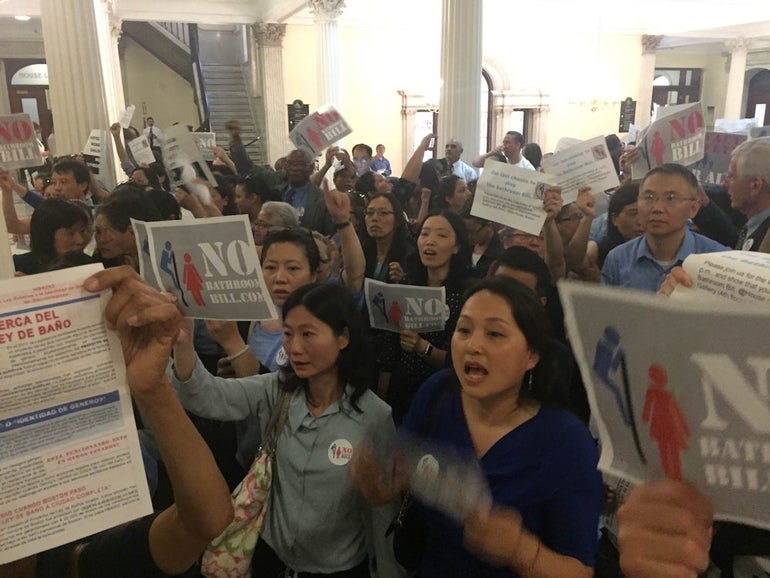After a bipartisan vote in the House Wednesday, legislative leaders need only to agree on the particulars of slightly varied transgender access bills before shipping a final version to a newly receptive governor.
The transgender bill (H 4343/S 735) cleared the House Wednesday with a slightly greater ratio of Republican support – 8 out of 34 – than the version that passed the Senate – 1 out of 5 – in May.
House lawmakers logged more than a dozen roll calls, rejecting 22 amendments before a final vote that saw House Second Assistant Majority Leader Paul Donato, a member of Democratic leadership, siding with the majority of Republicans in opposition to the legislation.
Both bills would provide transgender people with protection against discrimination in hotels, movie theaters and other public accommodations, as well as the right to use the changing room and bathroom corresponding to their gender identity rather than anatomical sex.
Proponents said the legislation would give transgender people greater acceptance and normalcy while opponents said it would infringe on people’s privacy in locker rooms and could encourage bad actors to seek access to restrooms used by children and women.
After the 116-36 vote, lawmakers left the House chamber and were greeted by activists on both sides of the issue who offered competing chants of “Shame on you” and “Thank you.”
The House version tasks the Massachusetts Commission Against Discrimination and the attorney general with determining how to determine gender identity and how to enforce laws against anyone “who asserts gender identity for an improper purpose.”
Republicans voting in support of the bill ranged in tenure from Rep. Paul Frost, who joined the House in 1997, to Rep. Hannah Kane, elected last year.
Exalting after the vote among transgender activists, House Speaker Robert DeLeo said he wanted “real victories” of a new law signed by the governor. After months of fence-sitting, Gov. Charlie Baker on Tuesday said he would sign the House version.
“It will be my wish that we’re able to avoid a conference committee. I believe that the governor made it clear that he would sign the House bill,” DeLeo told reporters. He said, “I’m hopeful that the Senate will follow our lead and have this pass.”
Andrew Beckwith, who has led the opposition to the bill as president of the Massachusetts Family Institute, told the News Service he is concentrating his efforts on Baker.
“Right now we’re focused on the governor and that’s going to be the totality of our efforts at the moment,” Beckwith told the News Service outside the State House. He said, “If the legislature won’t do it we’ll do whatever it takes to make sure we can make that happen.”
A collection of Democrat and Republican House members fruitlessly sought to alter the bill on the floor, proposing exceptions, penalties for malfeasance, and a ban on sex offenders from taking advantage of the bill’s bathroom access provision.
Rejected on a close vote was a Rep. John Rogers amendment that would have established a fine of up to $1,000 for anyone who “asserts a gender-related identity for any improper purpose.”
The Norwood Democrat’s proposal also would have made it a misdemeanor to falsely assert a gender identity to commit a misdemeanor, and would have made it a felony to falsely assert a gender identity to commit a felony, he said.
“The problem is that there is no penalty associated with the current law that says no one shall falsely assert a gender identity for an improper purpose,” Rogers said. “Right now, we have a toothless tiger on the books. In our zeal to protect our transgender constituents, we’re overlooking the fundamental flaw in the law right now that prescribes against that activity with consequences.”
The Rogers amendment was rejected on a 62-87 vote with 30 Democrats joining 32 Republicans in support of it.
On many amendments the majority did not offer arguments against the policy proposal before voting it down. Some of the most lopsided votes featured a small group of Democrats and Republicans on the losing side.
An amendment sponsored by Rep. James Lyons, an Andover Republican, would have specified that gender identity can be demonstrated by evidence of “medical history, care or treatment of the gender-related identity.”
The proposal to establish a medical standard attracted 11 votes with almost a third of them coming from Democrats – Reps. Colleen Garry of Dracut, James Miceli of Wilmington and Dennis Rosa of Leominster – all of whom voted against passage of the bill.
Joining Lyons and the three Democrats were Republican Reps. Donald Berthiaume of Spencer, David DeCoste of Norwell, Geoff Diehl of Whitman, Peter Durant of Spencer, Kevin Kuros of Uxbridge, Marc Lombardo of Billerica and Shaunna O’Connell of Taunton.
Midway through the debate, O’Connell said the House had offered “no compromise” and it appeared amendments had not even been “thought about” before being voted down.
Democrats also called Republicans’ motives into question on certain amendments.
Rep. Shawn Dooley, a Norfolk Republican who said he supported the underlying bill, argued for increased punishment of up to five years imprisonment for those who enter a changing room “with the intent of improper behavior by falsely claiming” to be transgender, arguing, “There will be people out there that want to abuse this law.”
Rep. Tim Toomey, a Cambridge Democrat, said Dooley’s amendment was an attempt to steer the conversation away from civil rights, calling it “a solution in search of a problem,” while Rep. Jeffrey Sanchez, a Jamaica Plain Democrat, interrupted Dooley to warn against “demonization” of people.
“The tone of this entire day was because we’re creating and protecting them as a class that we’re protecting people that want to prey on children,” Sanchez told the News Service after the debate. He said he didn’t take Dooley at his word. Dooley voted in favor of passing the bill.

